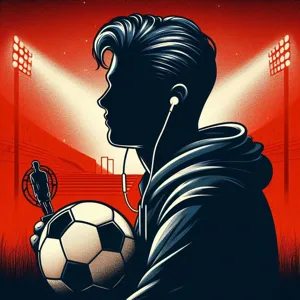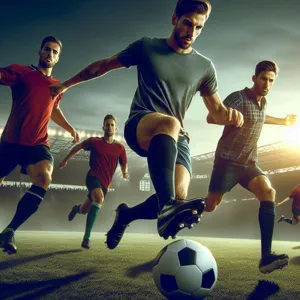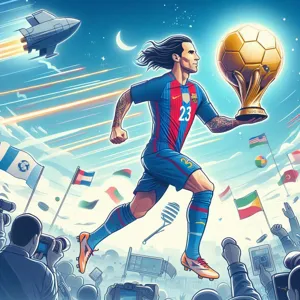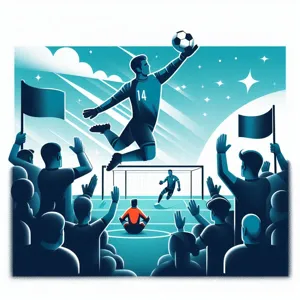In the world of sports, few debates ignite passion and fervor quite like the quest to identify the greatest soccer player of all time.
From the dazzling dribbles of Pelé to the mesmerizing skills of Diego Maradona, and the modern-day brilliance of Lionel Messi and Cristiano Ronaldo, each era has produced icons who have left an indelible mark on the beautiful game. As fans passionately defend their favorites, they often find themselves immersed in discussions that span generations, transcending mere statistics to delve into the artistry, impact, and legacy of these extraordinary athletes. In this post, we will dissect the GOAT debate by exploring the achievements, styles, and influences of the most revered players in soccer history, aiming to unravel the complexities of greatness and ultimately seek to answer the age-old question: who truly deserves the title of the greatest soccer player of all time? Join us on this exhilarating journey through soccer’s rich history and the legends who shaped it.
1. Introduction to the GOAT Debate in Soccer

The debate surrounding the greatest soccer player of all time—commonly referred to as the GOAT debate—has captivated fans, pundits, and players alike for generations. As one of the most popular sports in the world, soccer has produced countless legends, each leaving an indelible mark on the beautiful game. From the dazzling footwork of Pelé to the unparalleled vision of Diego Maradona, and more recently, the extraordinary talents of Lionel Messi and Cristiano Ronaldo, the list of contenders is as diverse as it is illustrious.
At the heart of this debate lies not just statistics or trophies but personal preferences shaped by individual experiences and biases. Some argue for the sheer impact of a player on the field, while others emphasize longevity and consistency. The nuances of playing styles, the eras in which these athletes competed, and the varying contexts of their achievements add layers to an already complex discussion.
In many ways, the GOAT debate transcends soccer itself; it sparks conversations about legacy, passion, and the very nature of greatness. As fans engage in spirited discussions, sharing stats and anecdotes, they also weave a tapestry of history that celebrates the rich tradition of the sport. So whether you find yourself firmly in one camp or appreciate the brilliance of multiple players, one thing is certain: the quest for the true GOAT of soccer will continue to ignite debates and inspire generations to come. In this blog post, we will delve into the key figures, their monumental contributions to the game, and the factors that fuel this ongoing discourse.
2. Defining “Greatest of All Time” (GOAT)
When we dive into the debate surrounding the title of the Greatest Soccer Player of All Time (GOAT), it’s crucial to first establish what “greatness” truly means in the context of the beautiful game. This title is not merely a reflection of individual skill or raw talent; it encompasses a myriad of factors that collectively shape a player’s legacy.
To begin with, one must consider individual achievements: the number of goals scored, assists made, and accolades earned throughout a player’s career. Legendary figures like Pelé and Diego Maradona dazzled fans with their extraordinary talents, leaving indelible marks on the sport through their individual performances. Yet, greatness isn’t solely about personal statistics; it also includes contributions to team success. Champions League titles, domestic league victories, and international honors weigh heavily in the conversation. Players who have led their teams to glory, such as Lionel Messi and Cristiano Ronaldo, often find themselves at the forefront of the GOAT discussion due to their ability to elevate those around them.
Another pivotal aspect of defining “greatest” is the impact a player has had on the game itself. This includes innovation, style of play, and the ability to inspire both teammates and fans. Think of how Johan Cruyff revolutionized soccer with his vision and philosophy, or how Zinedine Zidane’s elegance on the ball captivated audiences worldwide. Additionally, longevity and consistency play vital roles—great players often maintain their performance levels over many seasons, proving their resilience and dedication to the sport.
Cultural significance also cannot be overlooked. Some players transcend the sport, becoming icons that represent nations or eras, influencing generations of players and fans alike. The emotional connection they foster with their followers adds a layer of depth to their greatness that statistics alone cannot capture.
Ultimately, defining the GOAT is a complex interplay of talent, achievements, influence, and legacy. As we explore this ongoing debate, it becomes evident that the title is as much about the narrative woven through a player’s career as it is about the numbers that define their performance on the pitch. Each contender brings their own story to the table, making the quest to identify soccer’s greatest ever an endlessly fascinating and subjective journey.
3. Historical Context: Soccer’s Evolution and Key Players

To truly appreciate the debate surrounding the greatest soccer player of all time, one must first delve into the historical context of the sport itself. Soccer, known as football in most parts of the world, has evolved dramatically since its formalization in the mid-19th century. From its early days as a chaotic, unregulated game played in English villages to the structured, global phenomenon it is today, soccer’s journey reflects broader social and cultural changes, each era shaping the players who would come to define it.
In the early 20th century, legends like Pelé emerged, captivating audiences with their unparalleled skill and athleticism. Pelé’s dazzling footwork, incredible goal-scoring ability, and charisma on and off the pitch not only earned him three World Cup titles with Brazil but also helped popularize soccer worldwide. As television brought the game into living rooms across the globe, players like Diego Maradona took center stage, mesmerizing fans with his extraordinary dribbling and vision. Maradona’s infamous “Hand of God” goal and his remarkable solo run against England in the 1986 World Cup remain etched in soccer lore, showcasing the ability of a single player to alter the course of a game.
Fast forward to the late 20th and early 21st centuries, and we find the likes of Lionel Messi and Cristiano Ronaldo revolutionizing the sport yet again. Their relentless pursuit of excellence and record-breaking achievements have redefined what it means to be a soccer superstar. Messi’s incredible dribbling, playmaking capabilities, and his ability to score from virtually any position on the field make him a formidable force. Meanwhile, Ronaldo’s combination of speed, power, and aerial prowess has set new standards for athleticism in soccer, leading to a rivalry that has captivated fans and pundits alike.
As we traverse through the decades, it becomes evident that each generation of players not only reflects the evolving strategies and styles of play but also the ever-changing dynamics of global fandom. The GOAT debate is not merely about individual skill; it’s a tapestry woven from the threads of history, culture, and the collective memories of fans around the world. Understanding the historical context of soccer and the key players who shaped its journey is essential in navigating this intense debate, as it provides insights into what greatness truly means in the beautiful game.
4. The Candidates: A Look at the Top Contenders
When it comes to the debate surrounding the greatest soccer player of all time, the conversation is often dominated by a select few names—each bringing their own unique style, skills, and accolades to the table. Let’s delve into the profiles of the top contenders who have claimed their place in this prestigious discussion.
**Pelé** – Widely regarded as one of the original GOATs, Pelé’s legacy is steeped in spectacular achievements. With three FIFA World Cup titles (1958, 1962, 1970) under his belt, Pelé revolutionized the way the game was played with his extraordinary dribbling, powerful shot, and an uncanny ability to find the back of the net. His time at Santos FC cemented him as a national icon in Brazil, and his impact on soccer continues to resonate with fans around the globe.
**Diego Maradona** – Known for his dazzling dribbling and unparalleled vision, Maradona is often celebrated for his ability to single-handedly change the course of a match. His most iconic moment came during the 1986 World Cup, where he led Argentina to victory, famously scoring both the “Hand of God” goal and the “Goal of the Century” against England. Maradona’s flair, charisma, and off-field controversies further add to his mythical status in the soccer world.
**Lionel Messi** – A maestro of the modern game, Messi has redefined excellence over his illustrious career. With an unmatched ability to navigate through defenders and a record number of Ballon d’Or awards, Messi has consistently delivered jaw-dropping performances for both FC Barcelona and the Argentine national team. His recent triumph in the 2021 Copa America and the 2022 FIFA World Cup has only further solidified his claim to the title of the greatest, showcasing his relentless pursuit of perfection.
**Cristiano Ronaldo** – Known for his remarkable athleticism, goal-scoring prowess, and work ethic, Ronaldo has proven himself as a formidable competitor throughout his career. With an incredible tally of goals across multiple leagues—Premier League, La Liga, Serie A—and numerous Champions League titles, Ronaldo’s impact on the game is undeniable. His ability to adapt and excel at the highest level, combined with his impressive physical attributes, makes him a perennial contender in the GOAT debate.
Each of these players has left an indelible mark on the sport, captivating fans with their extraordinary talent and memorable moments. As we explore their accomplishments, playing styles, and legacies, it becomes clear that the title of “greatest of all time” is not only a matter of statistics but also one of personal connection and admiration among soccer enthusiasts. The debate continues, and with it, the rich tapestry of soccer history unfolds, inviting new generations to witness the magic of these legendary figures.
– Pelé: The King of Soccer

When discussing the greatest soccer player of all time, the name Pelé is often at the forefront of the conversation, earning him the revered title of “The King of Soccer.” Born Edson Arantes do Nascimento in 1940 in Brazil, Pelé’s journey from a humble upbringing to international superstardom is a testament to his unparalleled talent and relentless work ethic.
Pelé first captured the world’s attention at the tender age of 17 during the 1958 FIFA World Cup in Sweden, where he became the youngest player to score a goal in World Cup history. His extraordinary skill set, characterized by his lightning-fast speed, impeccable dribbling, and a powerful shot, helped Brazil secure its first World Cup title. Over the course of his illustrious career, Pelé would go on to win three World Cups (1958, 1962, and 1970), a feat that remains unmatched to this day.
What sets Pelé apart is not just his impressive trophy cabinet but also his ability to transcend the sport itself. He was a cultural icon, using his platform to promote soccer globally and inspire countless young athletes. His partnership with legendary players like Garrincha and Tostão, combined with his natural charisma, made him a magnetic figure on and off the field.
Pelé’s influence extended beyond just his playing style; he was a pioneer in marketing and endorsements, bringing soccer into the limelight in ways that had never been seen before. His iconic number 10 jersey became a symbol of excellence, and his legacy continues to inspire generations of players and fans alike.
In a debate about the greatest soccer player of all time, Pelé’s name is not just mentioned; it is celebrated. His impact on the game, his records, and his ability to unite people through the love of soccer solidify his place as the King of Soccer, a title that resonates with fans across the globe.
– Diego Maradona: The Genius
Diego Maradona: The Genius
When the conversation turns to the greatest soccer player of all time, Diego Maradona is a name that resonates deeply with fans around the globe. Known for his extraordinary skill, fiery passion, and controversial moments, Maradona’s legacy transcends the sport itself, embodying the very essence of soccer’s rich history.
Born in Lanús, Argentina, in 1960, Maradona was a prodigy from a young age. His dribbling ability was nothing short of mesmerizing, allowing him to glide past defenders with an effortless grace that made it seem as though the ball was tethered to his feet. The iconic “Hand of God” goal during the 1986 World Cup is perhaps the most famous moment of his storied career, showcasing both his cunning and unmatched talent. That same tournament also featured his stunning solo goal against England, where he danced through the entire defense, leaving viewers in awe of his genius.
Maradona’s influence extended far beyond the pitch. He was a symbol of hope for many in Argentina, particularly during a time when the country was grappling with political turmoil and economic hardship. His triumphs with the national team, culminating in the 1986 World Cup victory, united the nation in celebration, making him a national hero. Despite his incredible successes, Maradona’s life was marred by personal struggles, including battles with addiction and health issues, which only added layers to his complex character.
In club football, Maradona’s time at Napoli is legendary. He transformed the club from underdogs into Serie A champions, a feat that seemed impossible before his arrival. His charisma and flair ignited passion among fans, making the city of Naples a fervent supporter of his every move on the field.
Yet, Maradona’s genius was not without its controversies. His unpredictable nature on and off the field often drew criticism, leading to a tumultuous relationship with the media and governing bodies of soccer. Nevertheless, it’s this very complexity that makes Maradona a compelling figure in the GOAT debate. His ability to evoke such strong emotions—both adoration and ire—proves that he was more than just a player; he was a cultural icon, a revolutionary force in the world of soccer.
In the annals of soccer history, Diego Maradona stands out not only for his unparalleled talent but also for the indelible mark he left on the sport. His legacy continues to inspire new generations of players and fans alike, making it impossible to discuss the greatest of all time without acknowledging the genius of Maradona.
– Lionel Messi: The Modern Maestro

### Lionel Messi: The Modern Maestro
When the conversation shifts to the greatest soccer player of all time, Lionel Messi’s name invariably takes center stage, and for good reason. Hailing from Rosario, Argentina, Messi’s journey from a young boy with a growth hormone deficiency to a global soccer icon is nothing short of extraordinary. He embodies the very essence of the beautiful game, seamlessly blending skill, vision, and an innate understanding of football that few can rival.
Messi’s playing style is characterized by an astonishing combination of agility and precision. His low center of gravity allows him to weave through defenders with an uncanny ability, leaving opponents grasping at thin air. Whether he’s executing a perfectly timed through ball, unleashing a curling shot from outside the box, or showcasing his infamous dribbling skills, every touch of the ball is a testament to his artistry on the pitch. His balance and control are mesmerizing, often drawing comparisons to greats like Diego Maradona, yet Messi’s unique style has carved out a niche that is distinctly his own.
What truly sets Messi apart is not just his technical prowess but his ability to perform under pressure. Time and again, he has risen to the occasion, delivering breathtaking performances in crucial matches. From scoring vital goals in World Cup qualifiers to dazzling displays in UEFA Champions League finals, Messi thrives when the stakes are highest. His football IQ is exceptional; he consistently reads the game a step ahead, making him an invaluable playmaker as well as a prolific scorer.
Throughout his illustrious career, Messi has amassed a staggering number of records and accolades. From winning multiple Ballon d’Or awards to becoming Barcelona’s all-time top scorer, his achievements are a testament to his dedication and skill. But beyond the trophies and statistics, it’s his humility and love for the game that resonate most with fans. Messi is not just a player; he is a symbol of passion and perseverance, inspiring countless young athletes around the world to dream big.
As the debate over the greatest soccer player continues, one fact remains clear: Lionel Messi is a modern maestro whose impact on the game is indelible. His legacy goes beyond numbers; it lies in the joy he brings to fans and the respect he commands from peers and opponents alike. Whether he’s dazzling us with his footwork or leading Argentina to victory on the world stage, Messi’s magic is a reminder of why we fell in love with soccer in the first place.
– Cristiano Ronaldo: The Goal Machine
When discussing the greatest soccer player of all time, one name that consistently rises to the forefront is Cristiano Ronaldo. From the moment he burst onto the scene as a teenage sensation at Sporting Lisbon, it was clear that he possessed a rare blend of talent, determination, and an insatiable drive for success. With his chiseled physique and remarkable athleticism, Ronaldo redefined the role of a forward, transforming himself into a goal-scoring machine over the course of his illustrious career.
Ronaldo’s journey has taken him through some of the world’s most prestigious clubs, including Manchester United, Real Madrid, and Juventus. At each stop, he has shattered records and set new standards for excellence. His time at Real Madrid was particularly legendary, where he netted an astonishing 450 goals in just 438 appearances, establishing himself as the club’s all-time leading scorer. Alongside his individual accolades—five Ballon d’Or awards, multiple Golden Boots, and countless league titles—Ronaldo has also lifted the UEFA Champions League trophy multiple times, showcasing his ability to shine on the biggest stages.
What sets Ronaldo apart from his peers is not just his incredible goal tally but also his relentless work ethic and adaptability. Whether it’s his powerful long-range shots, deft headers, or dazzling footwork, Ronaldo has continually evolved his game to maintain his status at the pinnacle of soccer. His dedication to fitness and training is legendary; he often pushes his limits with rigorous workout routines, ensuring he stays at peak performance, even as he advances in age.
Beyond his individual prowess, Ronaldo’s impact resonates with fans worldwide. He is not only a symbol of sporting excellence but also a beacon of inspiration for aspiring athletes. His philanthropic endeavors, such as funding children’s hospitals and supporting various charitable causes, further enhance his legacy, proving that greatness extends beyond the pitch.
In the GOAT debate, Cristiano Ronaldo stands tall as a formidable contender. His unmatched goal-scoring record, consistency, and ability to thrive under pressure make him a true icon of the sport, ensuring that his name will forever echo in the annals of soccer history. As fans continue to engage in passionate discussions about the greatest player of all time, one thing remains clear: Cristiano Ronaldo’s footprint on the game is indelible, securing his place in the hearts of soccer lovers for generations to come.
5. Statistical Comparisons: Goals, Assists, and Achievements
When diving into the GOAT debate, statistics play a pivotal role in shaping opinions and providing a clearer picture of each player’s contributions to the beautiful game. The conversation often centers around three critical metrics: goals, assists, and overall achievements.
Let’s start with goals. The sheer number of goals scored is often the most straightforward way to assess a player’s offensive prowess. Icons like Pelé and Diego Maradona etched their names into the annals of history with their remarkable goal-scoring records. More recently, Lionel Messi and Cristiano Ronaldo have dominated the charts, consistently breaking records and setting new benchmarks that seem almost unattainable. With every goal, they not only entertain but also inspire countless aspiring players around the world.
However, goals alone don’t tell the full story. Assists are equally important, reflecting a player’s ability to create opportunities and work cohesively within a team. A player like Messi, revered for his vision and creativity, has frequently topped assist charts, showcasing his dual threat as both a scorer and a playmaker. Comparatively, Ronaldo’s style, characterized by his relentless finishing ability, illustrates a different approach to the game, often leading to debates on their overall impact on the pitch.
Beyond individual statistics, the achievements each player has garnered throughout their careers add another layer to the GOAT conversation. From World Cup triumphs to Champions League victories, the silverware collected speaks volumes about a player’s impact on the club and international levels. The prestige of winning Ballon d’Or awards also factors into this discussion, as it highlights the recognition from coaches, players, and critics alike.
As we analyze these statistical comparisons, it becomes evident that the debate over the greatest soccer player of all time is as much about numbers as it is about the narratives behind them. Each statistic tells a story, and when woven together, they create a rich tapestry that showcases the extraordinary talents of these legends. Whether you lean towards Messi’s magical dribbling and playmaking or Ronaldo’s athleticism and goal-scoring tenacity, the numbers provide a compelling foundation for this timeless debate.
6. Impact on the Game: Style, Technique, and Influence
When it comes to the GOAT debate, the impact on the game is an essential criterion that transcends mere statistics and achievements. The greatest soccer players do not just accumulate goals and assists; they redefine the very essence of the sport through their unique styles, innovative techniques, and lasting influence on future generations.
Consider the artistry of players like Diego Maradona, whose dribbling skills and vision transformed the way the game is played. His iconic ‘Hand of God’ goal and the mesmerizing ‘Goal of the Century’ against England during the 1986 World Cup showcased a blend of audacity and creativity that left an indelible mark on soccer history. Maradona’s influence extended beyond his playing days, inspiring countless young athletes to embrace the game with flair and passion.
Similarly, Lionel Messi’s low center of gravity and exceptional ball control have redefined the role of the forward. His signature dribbles and ability to navigate through tight defenses have not only secured him numerous accolades but have also influenced the tactical approaches of teams worldwide. Messi’s understated demeanor off the pitch contrasts sharply with the electrifying performances he delivers, making him a role model for aspiring soccer players who seek to blend humility with talent.
On the other hand, Cristiano Ronaldo’s athleticism and relentless work ethic have set new standards for physical fitness in soccer. His powerful strikes, aerial prowess, and unmatched goal-scoring ability have revolutionized the forward position, inspiring a new generation to focus on physical training and discipline. Ronaldo’s presence in the sport has also amplified the importance of branding and marketability, showing how modern players can leverage their influence beyond the pitch.
The style, technique, and influence of these players, along with others like Pelé, Johan Cruyff, and Zinedine Zidane, have shaped the game in profound ways. They not only entertain but also serve as catalysts for change, pushing the boundaries of what is possible in soccer. Their legacies continue to inspire fans and players alike, ensuring that the debate about the greatest soccer player of all time is as much about the impact on the game as it is about personal accolades. The question remains: who among them will ultimately be crowned the GOAT, and how will their contributions continue to resonate through the beautiful game?
7. Trophies and Honors: Club vs. International Success
When it comes to determining the greatest soccer player of all time, the debate often pivots around one crucial factor: trophies and honors. But herein lies a complex dichotomy—should we weigh club success more heavily than international achievements, or is there an inherent value in both?
Club success has long been the hallmark of greatness in soccer. Champions League titles, domestic league victories, and other prestigious club tournaments are often seen as the pinnacle of a player’s career. Legends like Lionel Messi and Cristiano Ronaldo have racked up an impressive array of trophies at their respective clubs, contributing significantly to their teams’ legacies and solidifying their status in the pantheon of soccer greats. Messi’s record-breaking haul at FC Barcelona, including multiple Champions League titles and countless domestic trophies, paints a picture of unparalleled club dominance. Similarly, Ronaldo’s triumphs across multiple leagues—including the Premier League, La Liga, and Serie A—demonstrate his adaptability and relentless pursuit of excellence.
However, dismissing international success would be a grave oversight. For many fans and pundits, the World Cup remains the ultimate test of a player’s mettle. Winning this coveted trophy can elevate a player’s status to legendary proportions. Consider the case of Pelé, who not only dazzled with his club performances but also led Brazil to three World Cup victories—a feat that has yet to be matched. Similarly, Diego Maradona’s extraordinary display in the 1986 World Cup, where he single-handedly guided Argentina to glory, cements his legacy not just in club football but as a national hero.
The challenge lies in balancing these two realms of achievement. Some argue that a player’s worth is diminished without international success, while others contend that club performances are where the true artistry and consistency of a player shine. Ultimately, the GOAT debate may never reach a definitive conclusion, but the interplay between club and international trophies undoubtedly shapes our understanding of what it means to be the greatest soccer player of all time. As fans, we are left to weigh the merits of each argument, acknowledging that every trophy, every honor, carries with it a story that contributes to the rich tapestry of soccer history.
8. The Role of Context: Era, Team Support, and Competition
When debating the title of the greatest soccer player of all time, one must consider the multifaceted role of context. Soccer, like any sport, is heavily influenced by the era in which a player competed, the quality of their teammates, and the level of competition they faced. These factors can dramatically shape a player’s legacy and the accolades they accumulate throughout their career.
**Era** is perhaps the most significant aspect to consider. The game has evolved immensely over the decades; from the tactical fluidity of the early 20th century to the fast-paced, physically demanding style of modern football, the conditions under which players perform vary greatly. For example, players like Pelé and Diego Maradona dazzled in times when the game was less commercialized, and physical conditioning was not as prevalent. Their brilliance shone through in an era where the sport was raw and unrefined, making their achievements all the more remarkable. In contrast, contemporary players like Lionel Messi and Cristiano Ronaldo thrive in a world this is driven by advanced analytics, global media scrutiny, and cutting-edge training techniques, making their records both impressive and reflective of the current game’s demands.
**Team support** is another crucial element. A player’s success is often contingent upon their teammates’ abilities and the tactical setups provided by their coaches. For instance, Messi’s magic at Barcelona was not just his own but also a product of a team that featured other world-class talents like Xavi, Iniesta, and later, Neymar. This synergy allowed him to flourish in ways that might not have been possible in a less equipped squad. Similarly, Maradona’s iconic World Cup victory in 1986 largely stemmed from his ability to elevate a seemingly average Argentine team into champions through his extraordinary skill.
**Competition** also plays a pivotal role in the GOAT debate. The level of rivals faced throughout a player’s career can influence perceptions of greatness. In the past, many legendary players competed against local clubs and national teams, whereas today’s stars are often up against the best from around the globe, with leagues that attract international talent. The sheer depth of talent in modern soccer adds layers to a player’s achievements, making it necessary to analyze not just the records but the context of their competition.
Ultimately, while individual brilliance is undeniable, the greatest soccer player is often a product of their environment. By considering the factors of era, team support, and competition, we can gain a more nuanced understanding of what greatness truly means in the beautiful game. This holistic view allows for a richer discussion, acknowledging that while flashy stats are impressive, the circumstances surrounding those achievements are just as critical in defining a player’s status in the pantheon of soccer legends.
9. Fan Perspectives: Passion and Loyalty in the GOAT Debate
When it comes to the GOAT debate in soccer, fan perspectives play a pivotal role, shaped by passion, loyalty, and personal experiences. The beauty of this sport lies not just in the goals scored or trophies won, but in the fervent connections fans develop with players and teams over the years. For many, the debate transcends statistics and achievements, delving into the emotional tapestry woven by unforgettable moments, iconic games, and the sheer joy or heartbreak that comes with supporting a player.
Each fan’s perspective is often colored by their own journey through the soccer landscape. A young child watching Lionel Messi weave through defenders for the first time might experience a sense of wonder that shapes their loyalty for years to come. Meanwhile, a devoted follower of Cristiano Ronaldo may recall the sheer exhilaration of witnessing his hat-tricks and record-breaking performances, solidifying a lifelong admiration. These experiences are not merely nostalgic; they are the foundation of identity for many fans, encapsulating memories shared with family and friends during pivotal matches.
Social media has amplified these passionate discussions, transforming fan debates into global conversations, where hashtags and memes keep the dialogue alive. From fiery arguments in the comments section to heartfelt tributes in fan forums, the GOAT debate serves as a platform for community and connection. Fans often cite not just the players’ skills, but their influence off the pitch—how they inspire the next generation, engage in philanthropy, and embody the spirit of the game.
Ultimately, the GOAT debate is as much about the players themselves as it is about the relationships they forge with their supporters. It’s a celebration of soccer’s ability to bring people together, to spark debates that can last a lifetime, and to create legacies that extend far beyond the field. Whether you’re Team Messi, Team Ronaldo, or rooting for another contender entirely, the passion and loyalty that fuel this conversation are what make soccer, and the quest for the greatest of all time, truly unforgettable.
10. The Influence of Media and Marketing on Player Legacy
The debate surrounding the greatest soccer player of all time (GOAT) often transcends pure statistics and on-field achievements; it is intricately woven into the fabric of media portrayal and marketing strategies that can shape a player’s legacy. In today’s digital age, where social media platforms and 24/7 news cycles dominate the sporting landscape, the narrative surrounding a player can be crafted and disseminated in real time, significantly influencing public perception.
Players like Lionel Messi and Cristiano Ronaldo have not only excelled on the pitch but have also skillfully navigated the media landscape. Their carefully curated images, bolstered by strategic marketing campaigns, have enhanced their appeal both on and off the field. From viral highlights on platforms like Instagram and TikTok to exclusive interviews and documentaries, these athletes have leveraged media to create a persona that resonates with fans across the globe. Their sponsorship deals with major brands amplify their visibility, cementing their status as icons in popular culture.
Moreover, the influence of media extends beyond individual players. The narrative spun around a player can elevate their standing in the GOAT conversation. For instance, a player’s involvement in charitable causes or their behavior during high-pressure moments can sway public opinion. Think of how Diego Maradona’s infamous “Hand of God” goal and subsequent performances in the 1986 World Cup have become legendary, thanks in part to media coverage that immortalized his exploits.
In contrast, players who may not have the same level of media exposure or marketing support might struggle to achieve recognition on the same level. The rise of analytics and in-depth statistics has also transformed how we evaluate greatness, often overshadowing the raw talent and passion that initially captured fans’ hearts.
Ultimately, the interplay between media, marketing, and player legacy is a fascinating aspect of the GOAT debate. As fans, we must consider how these elements shape our understanding of greatness and how they contribute to the ongoing conversation about who truly deserves the title of the greatest soccer player of all time. In a world where perception often trumps reality, the line between sports and spectacle continues to blur, leaving us to ponder: how much of the GOAT debate is driven by skill, and how much by the stories that surround these remarkable athletes?
11. Emerging Talents: Future Candidates for the GOAT Debate
As the debate over the greatest soccer player of all time (GOAT) continues to captivate fans and analysts alike, the emergence of new talents only adds fuel to the fire. The future of soccer looks promising with a fresh wave of gifted players stepping onto the global stage, each bringing unique skills and immense potential that could one day place them in the GOAT conversation.
Take, for example, **Jude Bellingham**. At just 20 years old, this English midfielder has already made a significant impact in top-flight European football. His combination of technical brilliance, tactical intelligence, and maturity on the pitch belies his age, drawing comparisons to legends who came before him. Bellingham’s performances in high-pressure situations, particularly in international tournaments, suggest he’s a player who thrives where it matters most.
Then there’s **Pedri**, the young Spanish maestro whose vision and creativity have left fans and pundits in awe. Playing for FC Barcelona, Pedri’s ability to control the tempo of the game and deliver pinpoint passes has drawn parallels to the great Andrés Iniesta. His potential to become a central figure in both club and international football is undeniable, making him a candidate to watch as he matures and gains experience in the coming years.
Another name to consider is **Erling Haaland**. With his explosive speed, remarkable goal-scoring ability, and physical presence, the Norwegian forward has taken the Premier League by storm. His impressive goal tally at such a young age showcases a rare combination of talent and poise, setting him on a trajectory that could see him join the ranks of soccer’s elite. Should he continue to shatter records and win trophies, Haaland’s name may soon be etched alongside the greats.
Lastly, we cannot overlook **Kylian Mbappé**, who has already proven himself on the world stage with a World Cup victory at just 19 years old. His electrifying pace and clinical finishing make him a nightmare for defenders and a joy for fans. As he continues to develop and lead his teams to glory, there’s no doubt that he will remain a central figure in the GOAT debate for years to come.
As these emerging talents navigate their careers, the soccer landscape will undoubtedly shift. While the legends of yesterday, like Messi and Ronaldo, have set a high bar, the excitement of new players entering the conversation keeps the debate vibrant and ever-evolving. Who knows? One of these budding stars may just become the next GOAT, adding a new chapter to the beautiful game’s storied history.
12. The Subjectivity of Greatness: Personal Preferences and Biases
When it comes to the debate over the greatest soccer player of all time, one undeniable truth emerges: greatness is subjective. Each fan carries their own unique lens through which they view the game, shaped by personal experiences, cultural influences, and emotional connections. A player’s greatness can be viewed through various prisms—be it their technical skill, leadership on the pitch, or impact on the club and country they represented.
For many, the nostalgia of watching a particular player in their prime can lead to a bias that colors their judgment. Perhaps you grew up idolizing Diego Maradona, whose dazzling dribbling and audacious goals captured the hearts of millions during the 1980s. For others, the modern flair and incredible statistics of Lionel Messi or the commanding presence and unmatched athleticism of Cristiano Ronaldo may define their criteria for greatness. They might argue that the modern game’s tactical evolution and increased competitiveness elevate contemporary players above their predecessors.
Cultural factors also play a significant role in shaping opinions. Fans from different regions of the world may have varying criteria for what makes a player “great.” In South America, the artistry and flair of a player might take precedence, while European fans may prioritize consistency and tactical intelligence. Moreover, tribal loyalty to a specific club can create biases that skew perceptions of greatness, leading supporters to defend their heroes staunchly while dismissing rivals.
Ultimately, the subjectivity of greatness enriches the GOAT debate, transforming it into a vibrant tapestry woven from personal stories, emotional ties, and deep-seated loyalties. This diversity of opinion not only underscores the beauty of soccer but also fosters discussions that keep the sport alive in the heart of its fans. Embracing this subjectivity allows us to appreciate the myriad of talents that have graced the pitch over the years while acknowledging that each fan’s perspective is valid in the ongoing quest to define the greatest of all time.
13. Conclusion: The Ongoing Nature of the GOAT Discussion
As we draw our exploration of the greatest soccer player of all time to a close, it becomes clear that the GOAT debate is far from settled. While fans and pundits alike passionately advocate for their chosen legends—be it Pelé, Diego Maradona, Lionel Messi, or Cristiano Ronaldo—the beauty of this discussion lies in its subjectivity. Each player has left an indelible mark on the sport, crafting their unique narratives filled with triumphs, heartbreaks, and a relentless pursuit of excellence.
The ongoing nature of the GOAT conversation reflects not only the diverse criteria by which we assess greatness—such as skill, achievements, influence, and style of play—but also the generational divides that color our perspectives. Younger fans may lean towards the modern-day icons who have redefined the game with their athleticism and technical prowess, while older generations may hold tightly to the memories of legendary players who graced the fields in earlier eras.
Moreover, as new talents emerge and records are broken, the parameters for greatness continue to evolve. Future players will undoubtedly ignite fresh debates and reignite old ones, ensuring that the question of who stands at the pinnacle of soccer will remain a lively topic for fans around the globe. Ultimately, what unites us in this ongoing discussion is our shared love for the beautiful game and the players who have captivated our hearts and minds. The GOAT debate is a testament to soccer’s rich history, reminding us that greatness is not merely defined by statistics, but by the emotions and memories woven into the fabric of the sport.
14. Final Thoughts: What Makes a Player Truly Great?
As we delve into the final thoughts of this exhilarating debate on the greatest soccer player of all time, it’s essential to reflect on what truly defines greatness in the realm of sports. Is it the number of trophies lifted, the records shattered, or the magical moments etched into the fabric of the game? Perhaps it’s a combination of all these elements, intricately woven together by the player’s unique style, charisma, and impact on both the pitch and the hearts of fans worldwide.
Greatness in soccer transcends mere statistics. It embodies the ability to inspire—a skill that few possess. Legends like Pelé and Diego Maradona not only dazzled with their extraordinary talent but also ignited passion in millions, lifting spirits and uniting cultures. Their influence resonates beyond the field, showcasing the power of soccer as a universal language.
Moreover, a truly great player demonstrates resilience and adaptability. They rise to the occasion when it matters most, transforming pressure into performance. Whether it’s a last-minute goal in a World Cup final or a crucial assist that secures a championship, these moments define legacies. The ability to perform consistently at the highest level, year after year, sets the greats apart from the good.
Additionally, the context of greatness matters. A player’s impact on their team and the game overall cannot be overlooked. Did they elevate their teammates? Did they redefine their position or challenge the status quo? Greatness often lies in the ability to leave an indelible mark on soccer history, shaping the future of the sport for generations to come.
Ultimately, the GOAT debate may never reach a definitive conclusion, as greatness is subjective and shaped by personal experiences and preferences. However, by examining the qualities that define a truly great player, we can appreciate the rich tapestry of talent that soccer has gifted us. From the dazzling footwork to the leadership on and off the pitch, the essence of greatness lies not just in individual accolades, but in the legacy left behind—a legacy that continues to inspire and elevate the beautiful game.
15. Call to Action: Join the Debate and Share Your Opinion!
The GOAT debate in soccer is a conversation that transcends generations, cultures, and continents, igniting passionate discussions among fans, pundits, and players alike. Now, it’s your turn to step into the arena! We want to hear from you. Who do you believe deserves the title of the greatest soccer player of all time? Is it the dazzling dribbles of Pelé, the mesmerizing magic of Diego Maradona, the unstoppable force of Lionel Messi, or the clinical precision of Cristiano Ronaldo?
Join the debate by sharing your thoughts in the comments section below. Tell us your pick, and back it up with your favorite moments, statistics, or anecdotes that highlight why your choice reigns supreme. Engage with fellow readers, challenge their opinions, and embrace the healthy rivalry that this discussion fosters.
Additionally, don’t forget to spread the word! Share this post on your social media and invite your friends to join in on the conversation. Let’s create a vibrant community of soccer enthusiasts passionate about the beautiful game. Your voice matters in this ongoing debate, and who knows? Your insights could spark the next great discussion in the world of soccer. So, lace up your boots and join us—this is one match you won’t want to miss!
As we conclude our exploration of the GOAT debate surrounding the greatest soccer player of all time, it’s clear that this discussion transcends mere statistics and accolades. From the mesmerizing footwork of Pelé to the dazzling brilliance of Diego Maradona, and the unparalleled consistency of Lionel Messi to the powerful presence of Cristiano Ronaldo, each player has left an indelible mark on the beautiful game. Ultimately, the title of “greatest” may vary depending on personal experiences and preferences, but what remains constant is the joy and passion these legends have brought to fans around the world. As you reflect on this debate, consider the moments that have moved you and the players who have inspired generations. Regardless of who you deem the greatest, one thing is certain: the legacy of these soccer icons will continue to fuel discussions for years to come. So, who’s your pick in this timeless debate? We’d love to hear your thoughts in the comments below!






